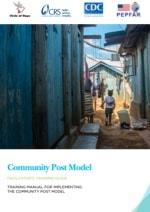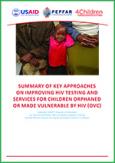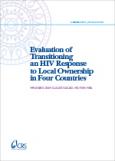Manuals | May 11, 2021
Circle of Hope
The Community Post Model is a Faith-Engaged Community Model of care designed to expand HIV care by improving the efficiency and efficacy of HIV case finding, linkage to treatment, and continuity of treatment in care. It focuses on identifying people living with HIV (PLHIV) and linking them to same-day ART initiation.
First envisioned and developed for the Zambian context by Circle of Hope (CoH), with support from Catholic Relief Services (CRS), the model decentralizes HIV service delivery, including HIV testing, comprehensive HIV care, and treatment, including differentiated ART delivery models, as well as HIV prevention services, from ART facilities to static Community Posts.
Circle of Hope was highlighted as a PEPFAR Solution for increasing HIV case finding, linkage and retention in treatment in rural and urban settings.
The Faith-based Action for Scaling Up Testing and Treatment for Epidemic Response (FASTER) project supported a training package for the scale-up of the Community Post Model within Zambia and beyond. The training package includes a Facilitator’s Manual, Participant’s Manual, and 11 PowerPoint Training Modules.
Community Post Model Guides (PDF)
PowerPoint Presentations
Module 1: Introduction & Overview of the Community Post Model
Module 2: Core Values & Principles (The RECIPE)
Module 3: Customer Care in the Community Post Model
Module 4: Stakeholder Engagement
Module 5: Community Scanning, Site Selection & Preparation
Module 6: Staffing & Capacity Building
Module 7: Service Delivery
Module 8: Case Identification & Linkage Strategies
Module 9: Supporting ART - Adherence, Continuity of Treatment and VLS
Module 10: Monitoring and Data Use for Program Improvement
Module 11: Addressing Community Post Implementation Challenges





